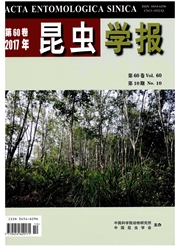

 中文摘要:
中文摘要:
甾醇是植物体内的重要次生物质,具有多种生物活性。为探明植物甾醇类物质对害虫的作用机理,采用叶碟饲喂法进行取食处理后研究了苍耳Xanthium sibiricum中分离纯化的甾醇类组分(甾醇A和甾醇B)对4龄菜青虫Pieris rapae的取食、酶活性以及中肠组织的影响。结果表明:苍耳甾醇类组分甾醇A和甾醇B能明显抑制菜青虫的取食,拒食中浓度AFC50分别为0.0229和0.0147mg/mL;同时,显著降低菜青虫中肠蛋白酶、淀粉酶和羧酸酯酶活性,其中,甾醇B的作用效果较强,处理后24h和36h,对蛋白酶活性抑制率分别为23.74%和58.59%,对中肠羧酸酯酶的活性抑制率分别为49.01%和83.03%;降低血淋巴蛋白质含量,诱导菜青虫血淋巴羧酸酯酶活性的提高;破坏昆虫中肠上皮组织,微杆模糊不清呈消融状,杯状细胞的杯腔基部微绒毛消失。这些结果说明苍耳甾醇类物质对菜青虫的取食抑制可能与对中肠消化酶活性的抑制以及对中肠上皮组织的破坏有关,植物甾醇组分的不同配比影响其对昆虫的作用效果。
 英文摘要:
英文摘要:
Sterols are important secondary metabolites in plants with a variety of biological activities.In order to reveal the mechanism of sterols from plants against insect pests,the effects of sterol constituents(sterol A and sterol B) extracted from Xanthium sibiricum(Compositae) on feeding,enzyme activities in the hemolymph and midgut,and midgut tissues of 4th instar larvae of Pieris rapae treated by feeding on leaf-discs of crucifer Brassica oleracea were investigated.The results showed that the feeding of P.rapae larvae was obviously deterred by sterol A and sterol B with the AFC50 of 0.0229 mg/mL and 0.0147 mg/mL,respectively,at 24 h after treatment.The activities of midgut amylase,protease and carboxylesterase(CarE) were significantly lower than those of the control within 36 h treatment,and sterol B showed stronger effects,which inhibited activities of midgut protease by 23.74% and 58.59%,and activities of midgut CarE by 49.01% and 83.03% at 24 and 36 h after treatment,respectively.Meanwhile,the content of hemolymph protein was reduced and the CarE activity in hemolymph was induced within the exposure time.Moreover,the microstructures of the tested larval midgut tissues exhibited such distinct pathological changes as the micro-rods of cylindrical epithelium dissolved and the goblet cells in the midgut epithelium deformed at 24 h after treatment.The results suggest that the inhibition of digestive enzyme activity and the damage of midgut tissues might be involved in feeding deterrence of the sterols from X.sibiricum against P.rapae larvae,and the proportion difference of plant sterols may affect their effects on insects.
 同期刊论文项目
同期刊论文项目
 同项目期刊论文
同项目期刊论文
 期刊信息
期刊信息
